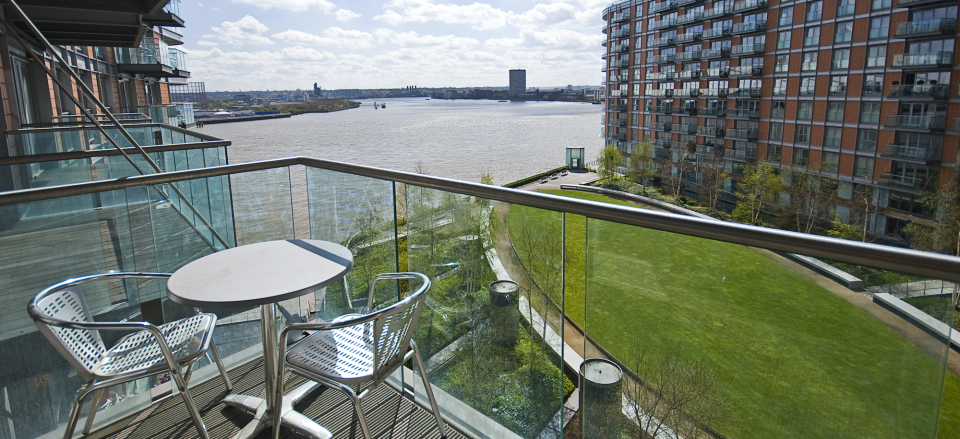Shared ownership scheme overhauled to help first-time buyers
The initial share purchase has been cut by more than half to 10%.
The shared ownership scheme in England is being overhauled to help more people get onto the property ladder.
The government is reducing the minimum initial share people must purchase from 25% to 10%.
Those using the scheme will also be able to purchase additional shares in their property in 1% instalments, with slightly reduced fees. Previously they had to buy in 5% or 10% instalments.
To further boost the affordability of home ownership, landlords of properties in the scheme will cover the cost of any repairs and maintenance for new owners for a 10-year period.
What is shared ownership?
The initiative aims to make buying a home more affordable by enabling people to purchase a share in a home and pay rent on the part they do not own.
A shared owner can gradually increase the amount of the property that they own by purchasing additional shares, known as staircasing, until they own it outright.
These additional shares are purchased at the market price, meaning that if house prices in the area increase or decrease, the value of the remaining shares in the home will reflect that price change.
All shared ownership properties are leasehold, so those living in them also have to pay an annual service charge.
To qualify for shared ownership, you must be a first-time buyer who cannot afford to purchase a property in the traditional way. Your household income must also be less than £80,000 a year.
When you come to sell the property, the housing association has the right to find a buyer for it if you own less than 100%. If you own the property outright, it has the right to buy it back from you, known as first refusal, for up to 21 years after you acquired full ownership.
When do the changes come into effect?
The new model will apply to all new-build shared ownership homes delivered through the new Affordable Homes Programme, which is due to begin in 2021.
The majority of rented homes built under this programme will also come with the right to be part of shared ownership to enable social housing tenants to purchase a stake in their home.
What’s the background?
The shared ownership scheme sits alongside a number of government initiatives to help people purchase a property, including the Help to Buy scheme, Lifetime ISAs and Starter Homes.
The changes to shared ownership are designed to help more young people get onto the housing ladder.
The government says 87% of people would choose to own a property if they could, but the number of those aged under 35 who were homeowners had declined to just 27%, down from 65% in the 1990s.
Top three takeaways
-
Shared ownership is being overhauled to help more people get onto the property ladder
-
The minimum initial share is being reduced to 10% from 25%
-
Those using the scheme will also be able to purchase additional shares in their property in 1% instalments
‘Bank of Mum and Dad’ to fund nearly a quarter of house purchases this year
Family and friends will hand over an average of £20,000 each, according to Legal & General.
Nearly one in four property transactions in 2020 will be funded by the ‘bank of mum and dad,’ compared with just one in five a year ago.
Buyers have become increasingly reliant on financial support from loved-ones amid the economic uncertainty of the coronavirus pandemic, with parents or friends expected to be involved in 23% of all property purchases this year, up from 19% in 2019.
The ‘bank of mum and dad’ is expected to contribute towards an estimated 175,000 property purchases with a collective value of £50.3bn this year, handing over an average of £20,000 each, according to Legal & General.
Total lending is expected to fall from £6.3bn in 2019 to £3.5bn this year as a result of the disruption caused to the housing market by the coronavirus pandemic.
Friends and relatives are also predicted to be involved in 85,000 fewer transactions in 2020 than last year. But despite this drop, 24% of buyers say they are now more reliant on help from their parents and others than previously.
A whopping 65% of people who have recently bought a home say they would not have been able to do so without financial help.
Why is this happening?
First-time buyers have long been reliant on help from the ‘bank of mum and dad’ to put together a housing deposit.
Coronavirus appears to have increased this need, with buyers not only facing increased economic uncertainty, but many lenders have also withdrawn mortgages for borrowers with 5% or 10% deposits.
The research found that 15% of family members who were helping a buyer were now giving more than they would have done before the pandemic, with one in five increasing their contribution by at least 50%.
Who does it affect?
Unsurprisingly, buyers in London receive the most help at an average of £25,800, followed by those in the East Midlands at £24,100 and Wales at £23,900.
People purchasing a property in the capital were also most likely to need support, with 41% receiving some financial help, with buyers in the West Midlands and Scotland coming in joint second place at 27%.
At the other end of the spectrum, buyers in the North East and Yorkshire and the Humber only needed average contributions of £13,800 from the ‘bank of mum and dad’.
They were also the least likely to require assistance, with under 20% needing to call on friends or family for financial help.
What’s the background?
Four out of 10 people who helped a friend or relative buy a property funded the loan from cash savings, while 27% used money they inherited.
While 16% used investments, 12% needed to downsize their own property in order to unlock the cash.
Nigel Wilson, chief executive of Legal & General, said: “Generous parents, grandparents, family members and friends are gifting thousands towards deposits, with the ‘bank of mum and dad’ outpacing even stamp duty cuts as a driver of renewed housing market activity.”
Top three takeaways
- Nearly one in four property transaction in 2020 will be funded by the ‘bank of mum and dad’
- Family and friends are expected to help fund an estimated 175,000 property purchases
- Total lending is expected to fall from £6.3bn in 2019 to £3.5bn as a result of the disruption caused to the housing market by the coronavirus pandemic


